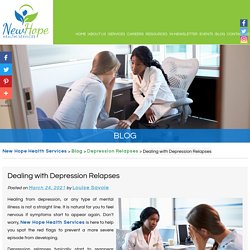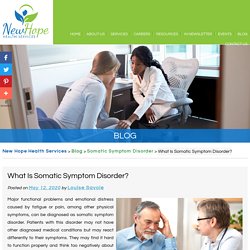

Dealing with Depression Relapses. Healing from depression, or any type of mental illness is not a straight line.

It is natural for you to feel nervous if symptoms start to appear again. Don’t worry, is here to help you spot the red flags to prevent a more severe episode from developing. Depression relapses typically start to reappear during a patient’s recovery from an earlier episode. These are most likely to occur within two months after undergoing behavioral health services in DC. Here are some of the signs to look out for: Social withdrawal.Sudden loss of interest in activities: sports, hobbies, sex, etc.Drastic changes in sleep patterns such as insomnia or excessive sleeping.Strong and consistent feelings of guilt and worthlessness.Concentrations and memory problems. You may find that these are quite common to the symptoms of “regular” depression, but relapses don’t happen for no reason. Learn About the Histrionic Personality Disorder. The Histrionic Personality Disorder is one of the groups of PDs called “dramatic personality disorders”.

This is because people with these types of disorders have really intense and unstable emotions, coupled with a distorted self-image. Their self-esteem solely depends on the approval of others and does not come from a true feeling of self-worth. People with this disorder will do almost anything just to get attention, which results in them behaving inappropriately just to be noticed. People with histrionic personality disorder rarely think that there’s something wrong with how they respond to and process information. Harmful Effects Mental Illness Stigma. Undergoing mental health rehabilitation can be a difficult choice for an individual who are suffering or diagnosed with a mental illness.

They are afraid that they people will make fun of them once they knew about their condition. We cannot deny the fact that most people have negative impressions when it comes to mental illness. They tend to give offensive labels and names to a person with mental illness which is definitely not a good way to deal with someone whose mental and emotional is fragile. Mental illness stigma should be stopped. Some of its harmful effects include: Being ashamed, feeling hopeless, and preferring isolationBeing reluctant to ask for help or to seek professional helpLack of understanding from family, friends, or othersBeing bullied, experiencing physical violence or harassmentHaving fewer opportunities for employment or social interaction Here at , we offer quality mental health service in Washington, DC.
Dealing with Denial of Mental Health Problems. The stigma associated with having mental health issues is still prevalent in our society today.

Despite help being readily and easily accessible to everyone, there are still those who refuse to avail of mental health service in Washington, DC simply because they’re ashamed of what other people may think of them. Being in denial of one’s mental health issues, such as depression, bipolar disorder, anxiety, or eating disorders, is detrimental to their health. If you’re dealing with someone who is in denial of their condition, you should note that they do believe that they’re not sick and do not have any symptoms—even if you confront them with evidence that they do.
Anger Management: Tips to Help You Stay Calm. Anger is a normal emotion in response to a situation.

However, if it leads to aggression, outbursts, and violence, then it might cause problems and conflicts, especially to family, friends, and loved ones. Early Warning Signs of Anxiety Disorders. Anxiety is a normal response, especially to grueling life events, such as changing jobs, having financial problems, or moving to a new place.

But, once the symptoms of anxiety begin to interfere with your life, then they could be a sign of anxiety disorder. Anxiety disorders can be crippling, but with the help of behavioral health services in DC, they can be manageable. The key to understanding anxiety is by recognizing its symptoms below. Excessive worrying Excessive worrying is associated with anxiety disorders, especially when the worrying becomes uncontrollable and occurs on most days for at least six months.
The worrying is so severe that you can’t focus and accomplish your daily tasks. Stress-Free Life: Building Strong Family Relations. Many individuals suffer from mental health issues due to stress caused by the work environment or conflict with relatives.

With the help of behavioral health services in DC, you can build strong interpersonal relations with your family and alleviate the pressure or feeling of agitation. Dealing with Mental Health in the Workplace. In today’s global crisis, you must be grateful if you have a full-time job.

To have a more secure life during the pandemic means a lot for many families. However, some employees are facing the fear of losing a job because of an unstable economy. For this reason, companies providing behavioral health services in DC intervene to help employers and employees in dealing with mental health issues. Employers should create a comprehensive approach Beyond the assurance of a stable job, businesses should develop a strategic approach to address depression and anxiety. Programs, such as mental health awareness and anxiety prevention, are significant in any working situation.
Create an atmosphere in your workplace conducive for productive professional work and personal development. How Anger Management Helps You. Anger is a normal and usually healthy human emotion.

It may be felt like a fleeting annoyance or a full-fledged rage. However, this may lead to problems if it gets out of control and turns destructive. It may start to affect your work, personal relationships, and overall quality of life. What Is Somatic Symptom Disorder? Major functional problems and emotional distress caused by fatigue or pain, among other physical symptoms, can be diagnosed as somatic symptom disorder.

Patients with this disorder may not have other diagnosed medical conditions but may react differently to their symptoms. They may find it hard to function properly and think too negatively about their symptoms. Art Therapy: How Creativity Contributes to Recovery. Currently, many studies that suggest art as a form of therapy for those who are undergoing mental health rehabilitation for depression, anxiety, PTSD, and other mental health conditions. Art therapy can be beneficial for those who are overwhelmed by the pressures of life.
It gives them a chance to escape the fast-paced lifestyle and slow down to explore the issues they are having. This form of therapy is not mainly about becoming a great artist but to find meaning and connection in your life through your creativity. What Should I Do When My Loved One Refuses to Get Help? Is your loved one refusing to get mental health rehabilitation? There are numerous reasons why they would do so. However, as a provider of mental health service in Washington, DC, we believe that getting professional help for your loved one’s condition would improve their well-being for the long term. Why You Should Consider Checking into Rehab. Substance abuse can ultimately ruin your life. You can hide your addiction behind seemingly harmonious relationships and successful careers.
How Walking Helps Promote Mental Health. Spotting Hidden Signs of Depression in Loved Ones. Most people suffering from depression are often uncomfortable reaching out to their loved ones about what they’re going through. So they keep it to themselves and refuse to seek help, denying themselves the comfort they could receive from their loved ones, as well as the chance of recovering through mental health rehabilitation. As a result of their self-imposed emotional isolation, healing becomes difficult and they become more depressed. Different Approaches to Psychotherapy. Anger Management: Keeping Your Anger at Bay. Anger is a healthy and normal emotion. PTSD: How to Encourage Someone to Get Help. A traumatic event can be devastating to a person. So when our loved one goes through this situation, they can develop post-traumatic stress disorder (PTSD).
5 Ways You Can Overcome the Stigma about Mental Health. Mental health issues are considered as real medical illnesses that require real treatments. 3 Reasons Why Counseling Is Important. Are you feeling lost and confused? Do you feel overwhelmed by your circumstances?